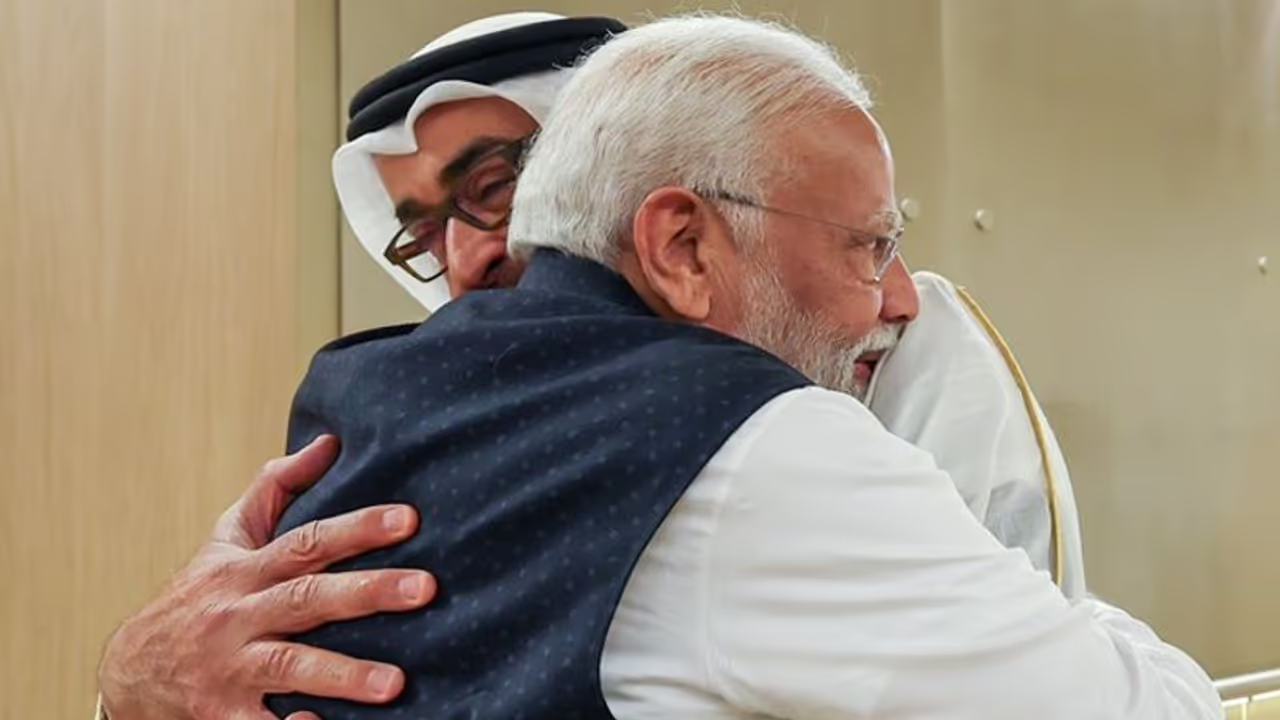"The BAPS temple in the UAE is an example of your affinity for India. Construction of the temple here would not have been possible without your support," PM Modi said ahead of tomorrow's grand inauguration.
Prime Minister Narendra Modi engaged in extensive discussions with UAE President Sheikh Mohamed bin Zayed Al Nahyan on Tuesday, where they assessed the strategic partnership, explored avenues for collaboration, and observed the signing of numerous agreements, notably a bilateral investment treaty.

During his meeting with the UAE President, PM Modi also expressed gratitude, acknowledging that the construction of the BAPS (Bochasanwasi Akshar Purushottam Swaminarayan Sanstha) temple would not have been possible without the support of the UAE leadership. He also expressed gratitude to President Al Nahyan for his personal support and generosity in providing the land for the construction of the BAPS Temple in Abu Dhabi.
Both parties emphasized that the BAPS Temple symbolizes the celebration of UAE-India friendship, strong cultural ties, and reflects the UAE's global dedication to harmony, tolerance, and peaceful coexistence.
"The BAPS temple in the UAE is an example of your affinity for India. Construction of the temple here would not have been possible without your support," PM Modi said ahead of tomorrow's grand inauguration.
In a remarkable and cordial gesture, President Mohamed bin Zayed personally welcomed Modi at the Abu Dhabi airport earlier today, embracing each other warmly, followed by a ceremonial guard of honour.
After Modi's arrival, the two leaders engaged in both one-on-one and delegation-level discussions, reviewing their bilateral partnership and exploring new avenues of cooperation.
They expressed satisfaction at the deepening of the Comprehensive Strategic Partnership, spanning various sectors such as trade, investment, digital infrastructure, fintech, energy, infrastructure, culture, and people-to-people ties, as highlighted by the Ministry of External Affairs in a statement. Discussions also encompassed regional and global matters.
"I thank you for this grand welcome of me and my team. As you said, I feel that whenever I have come here, I have always felt that I have come to my home and family," Prime Minister Modi said in his opening remarks at the bilateral meeting with the UAE President.
"We have met five times in the last seven months. Today, there is a mutual partnership between India and UAE in every sector," he said.
The two leaders witnessed the signing of eight agreements, which encompassed a Bilateral Investment Treaty, a Memorandum of Understanding (MoU) concerning cooperation in electrical interconnection and trade, and an Intergovernmental Framework Agreement between India and the UAE regarding the India-Middle East Economic Corridor.
Among these, the Bilateral Investment Treaty stands out as a crucial mechanism to facilitate increased investments in both nations. Notably, India has entered into both a Bilateral Investment Treaty and a Comprehensive Economic Partnership Agreement with the UAE, as per the statement.
Additionally, the agreements encompassed cooperation in Digital Infrastructure Projects, a Cooperation Protocol between the National Archives of both countries, an MoU focusing on heritage and museum cooperation, an agreement on linking instant payment platforms - UPI (India) and AANI (UAE), and an agreement linking domestic debit/credit cards - RuPay (India) with JAYWAN (UAE).
The leaders also deliberated on enhancing their partnership in the energy sector and recognized the significance of the UAE as one of the largest suppliers of crude oil and LPG (Liquefied Petroleum Gas). Additionally, they acknowledged India's shift towards entering into long-term contracts for LNG (Liquefied Natural Gas).
PM Modi also expressed gratitude for his attendance at the Vibrant Gujarat Global Summit in January, as well as for the UAE's support for the India-Middle East-Europe Economic Corridor (IMEEC), which was announced in New Delhi during the G20 summit in September.
The IMEEC, considered an alternative to China's Belt and Road Initiative (BRI), will connect India, the United Arab Emirates (UAE), Saudi Arabia, Jordan, Israel, and Europe.
PM Modi highlighted that the corridor will not only foster regional connectivity but also facilitate economic development. Additionally, he extended his appreciation to the President for the grand diaspora event.
